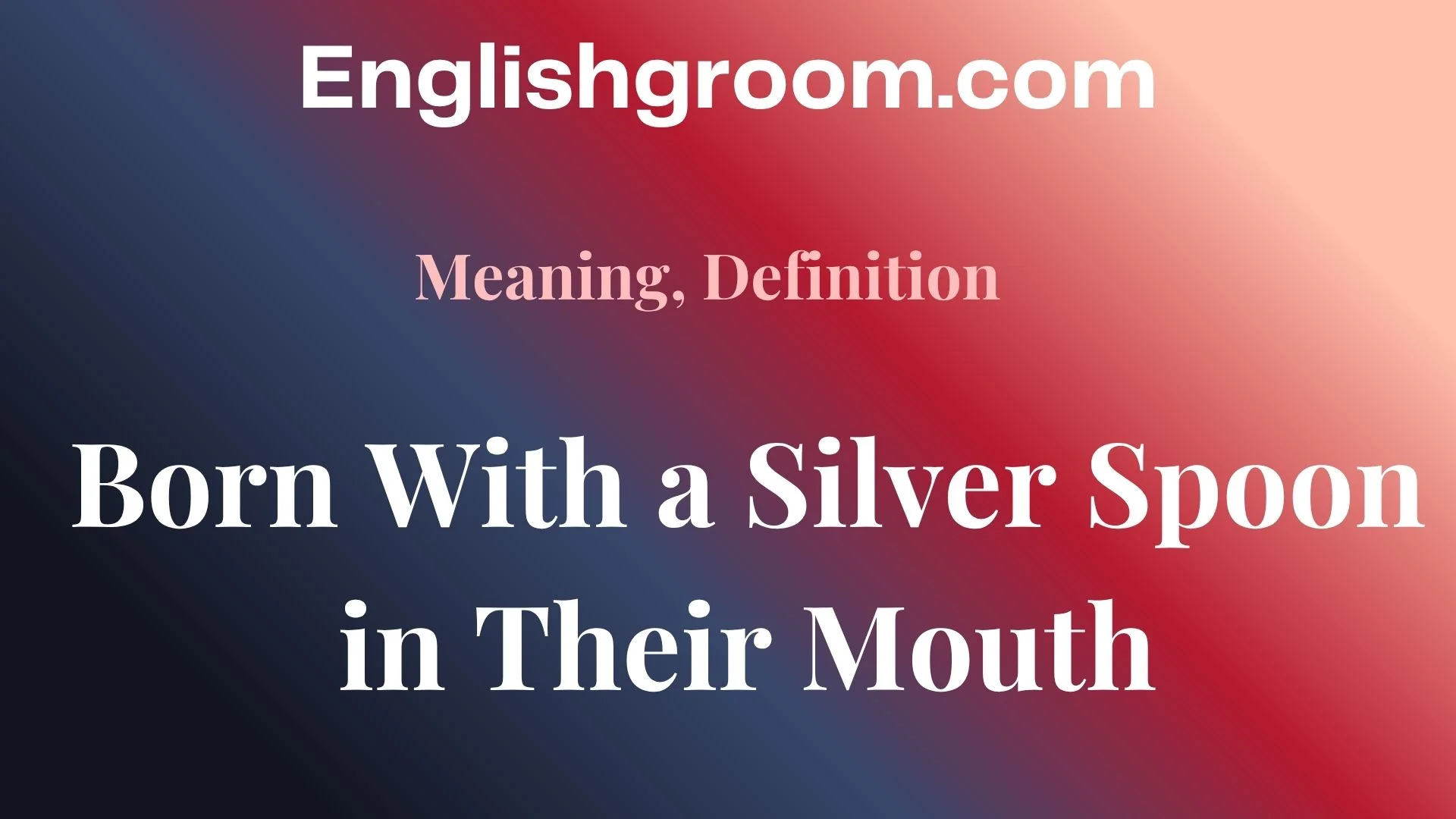Why the Phrase “Born With a Silver Spoon in Their Mouth” Still Matters Today
Ever heard someone say, “He was born with a silver spoon in his mouth”? It’s not about actual cutlery. This old idiom still echoes today because it perfectly captures the idea of being born into privilege—a concept that hasn’t aged a day.
In every society, wealth, opportunity, and influence tend to flow along family lines. The phrase might sound old-fashioned, but its meaning is timeless. Whether it’s the heir of a business empire or a celebrity’s child with instant fame, the “silver spoon” still feeds conversations about inequality, luck, and social advantage.
Let’s dig into where it came from, what it really means, and why it continues to shape our understanding of privilege.
The Origins of the “Silver Spoon” Idiom
The phrase “born with a silver spoon in their mouth” dates back several centuries. The earliest recorded use appears in the 18th century, but the symbolism of the silver spoon began much earlier.
In old England, wealthy families often gave silver spoons as christening gifts. This tradition represented prosperity and protection. Poorer families couldn’t afford silver; they used wood or pewter. So, a baby with a silver spoon literally started life with more wealth—both materially and symbolically.
Historical Context
- 16th–17th centuries: Silver was expensive, owned mainly by aristocrats.
- Baptismal rituals: Godparents offered silver spoons as a sign of lifelong fortune.
- European influence: The practice spread from England to Spain and colonial America.
Why Silver?
Silver symbolized purity, wealth, and divine favor. It was more attainable than gold yet still luxurious. Owning it meant belonging to the upper tier of society.
Quote: “Silver spoons fed not only mouths but reputations.” — Anonymous Historian
Silver Spoons as Historical Status Symbols
Before modern wealth indicators like luxury cars or real estate portfolios, silverware was a visible badge of class. In the 1600s, few people could afford silver cutlery. Those who could displayed it proudly.
Economic Snapshot
| Century | Material | Social Meaning | Common Owners |
|---|---|---|---|
| 1500s | Pewter/Wood | Modest living | Commoners |
| 1600s | Silver | Wealth, refinement | Nobility |
| 1700s | Silver & Gold-plated | Old money | Aristocrats, Merchants |
| 1800s | Silver-plated steel | Rising middle class | Industrial elite |
In England, noble families often commissioned entire silver dining sets engraved with family crests. These items weren’t just utensils—they were legacy symbols, passed down through generations.
By the 19th century, industrial progress made silverware more accessible. Yet, the idiom retained its meaning—being “born with a silver spoon” still referred to inherited privilege, not shiny tableware.
The Phrase Across Cultures
Every culture has its own way of describing people who start life ahead. While English uses “silver spoon,” others use equally vivid imagery.
| Language | Equivalent Phrase | Translation | Meaning |
|---|---|---|---|
| Spanish | Nació en cuna de oro | Born in a cradle of gold | Born rich |
| French | Né avec une cuillère en argent dans la bouche | Born with a silver spoon | Same idiom |
| Chinese | 含着金钥匙出生 (hán zhe jīn yàoshi chūshēng) | Born holding a golden key | Privileged birth |
| Hindi | Chandi ki chamach munh mein lekar paida hua | Born with a silver spoon | Wealth at birth |
Common Thread
Regardless of language, humans instinctively notice inequality. Each phrase captures how birth circumstances dictate access, opportunity, and sometimes, destiny.
Symbolism and Evolution Through History
The “silver spoon” isn’t just a metaphor for money. It represents access, opportunity, and expectation—ideas that have evolved across centuries.
From Nobility to Modern Privilege
- Victorian Era: The phrase symbolized aristocracy and old money.
- Industrial Age: “New rich” families started being resented for flaunting newfound wealth.
- Modern Times: The idiom applies to political dynasties, celebrity families, and tech heirs.
In literature, William Shakespeare never used the exact phrase, but his plays often explored class privilege—the seeds of this metaphor. Later, writers like Charles Dickens and F. Scott Fitzgerald portrayed “silver spoon” characters struggling between luxury and identity.
Example: Jay Gatsby wasn’t born with a silver spoon, but he spent his life chasing one.
The True Meaning of “Born With a Silver Spoon in Their Mouth”
At its core, the idiom means being born into wealth, privilege, and influence—advantages that open doors before one even learns to walk.
Broader Interpretation
- Privilege at birth: Access to quality education, healthcare, and networks.
- Inherited advantage: Family wealth and social connections.
- Unseen benefits: Cultural capital and emotional security.
This idiom isn’t just about money—it’s about starting lines. Some people begin life miles ahead because of family legacy, not personal effort.
Wealth and Privilege: Then vs. Now
The meaning of privilege has changed, but its power hasn’t faded. Let’s compare past and present.
| Era | Definition of Privilege | Primary Drivers | Social Impact |
|---|---|---|---|
| 18th Century | Aristocratic birth | Land ownership, nobility | Fixed class structure |
| 19th Century | Industrial wealth | Manufacturing empires | Rise of middle class |
| 20th Century | Corporate inheritance | Business dynasties | Economic inequality |
| 21st Century | Global influence | Technology, media | Widening wealth gap |
Modern Parallel
Today’s “silver spoons” are born into corporate dynasties and tech empires. Think of families like the Waltons (Walmart), Rockefellers, or Kardashians. Their influence isn’t just financial—it’s cultural.
Fact: According to Oxfam, the richest 1% own nearly half of global wealth.
The phrase now covers not just birthright but systemic privilege, including race, geography, and education.
How Silver Spoons Shape Society: The Mechanics of Inherited Wealth
Privilege doesn’t vanish; it compounds. Inherited wealth often stays within families thanks to structured financial systems.
Key Mechanisms
- Trust funds: Legally protected assets for heirs.
- Family offices: Firms managing intergenerational wealth.
- Tax shelters: Legal strategies to preserve capital.
- Estate planning: Ensures wealth transfer with minimal loss.
- Private education: Keeps elite networks intact.
Table: Wealth Transfer Tools by Country
| Country | Primary Mechanism | Inheritance Tax | Notes |
|---|---|---|---|
| United States | Trusts, family foundations | Up to 40% | Wealth shielded via trusts |
| United Kingdom | Family offices, estates | 40% | Loopholes for agricultural assets |
| Japan | Family businesses | 55% | High tax but strong family ties |
| Sweden | Investments, education funds | 0% | Abolished inheritance tax in 2005 |
| UAE | Family-owned companies | 0% | Sharia law guides wealth transfer |
These mechanisms perpetuate what economists call “intergenerational inequality.” In simpler terms, those born with silver spoons often stay fed by them.
Public Perception and the Silver Spoon Stereotype
People born into wealth often face stereotypes—some fair, others false.
Common Misconceptions
- They don’t work hard.
- Everything is handed to them.
- They lack empathy or awareness.
Reality Check
Not all “silver spoon” individuals fit the mold. Some leverage their resources for good.
Case Studies
- Anderson Cooper: Heir to the Vanderbilt family, yet built his career in journalism independently.
- Warren Buffett’s children: Despite immense wealth, were encouraged to forge their own paths.
- Prince Harry: Born into royalty, but stepped back to redefine his identity.
Challenges Faced
- Living under public scrutiny.
- Struggling to define self-worth.
- Pressure to maintain family legacy.
Quote: “Privilege isn’t just a gift—it’s a test of what you’ll do with it.”
Modern Relevance: Is the Metaphor Still Accurate?
Absolutely. But it’s evolved. Today, “silver spoons” aren’t limited to nobles or business heirs. They include influencer families, politicians’ children, and startup heirs.
Contemporary Symbols of Privilege
- Private education: Access to elite universities.
- Global networks: Family names open doors worldwide.
- Inherited platforms: Fame and influence without effort.
Despite growing awareness about inequality, the myth of meritocracy persists. The belief that everyone can rise equally often ignores invisible head starts.
Example: Two students may work equally hard, but only one can afford unpaid internships abroad—a silent advantage of the silver spoon.
What the Silver Spoon Teaches Us About Society
The idiom reminds us that not all success starts from zero. Understanding this isn’t about resentment; it’s about awareness.
Lessons Learned
- Privilege shapes opportunity before effort enters the scene.
- Wealth isn’t the only inheritance—connections and culture matter too.
- Society’s challenge is creating systems where birth doesn’t dictate destiny.
Policy Implications
- Fairer inheritance taxation.
- Broader access to quality education.
- Equal opportunity programs for underprivileged youth.
Privilege doesn’t make success illegitimate, but recognizing it helps us build fairer societies.
FAQs: Understanding “Born With a Silver Spoon in Their Mouth”
What does “born with a silver spoon in their mouth” mean?
It means someone was born into wealth or privilege, often enjoying advantages others must work for.
Where did the phrase originate?
It began in England, where giving silver spoons at christenings symbolized good fortune and class.
Is being born with a silver spoon always negative?
Not necessarily. The phrase highlights privilege, but how one uses it—selfishly or responsibly—defines its moral weight.
Do similar idioms exist in other languages?
Yes. Many cultures have equivalents, such as “born in a golden cradle” (Spanish) or “born holding a golden key” (Chinese).
Can someone lose their ‘silver spoon’ status?
Yes. Poor financial management, changing laws, or rejection of family wealth can strip inherited privilege.
Conclusion
The phrase “born with a silver spoon in their mouth” captures one of humanity’s oldest truths—not all beginnings are equal. Some inherit wealth, others inherit struggle. Yet what defines people isn’t what they start with, but what they do with it.
Understanding the idiom helps us see privilege not as shameful but as a responsibility. Silver spoons can feed comfort or change—it depends on the hand that holds them.

Hi! I’m Sami, a 28-year-old content writer with a love for words and storytelling. Writing has always been my way of expressing ideas, sharing knowledge, and connecting with people. I enjoy creating engaging and well-researched content—whether it’s blogs, articles, or social media posts—that not only informs but also inspires readers. My goal is to turn complex ideas into clear, creative, and meaningful pieces of writing that leave a lasting impact.



